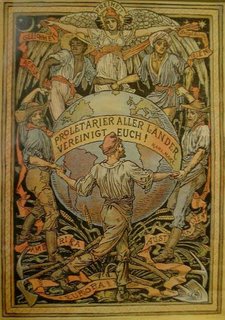
Today’s Guardian has an interesting piece on trade union responses to globalisation, based largely on how the GMB and SEIU (Service Employees International Union from the USA) have been dealing with Group 4 Securicor and showing solidarity with workers employed by the company elsewhere in the world. (http://money.guardian.co.uk/workweekly/story/0,,1842717,00.html).
This set me thinking about how we should be developing our international work as trade unionists in public services. Our traditional approach to international work is to show solidarity – this is defined on the UNISON international website as follows; “Solidarity means speaking out when fellow trade unionists are under threat - in Colombia, Burma or Zimbabwe, for instance. Solidarity also means helping sister trade unions to build their organisations on their own terms.”
This is an important part of our obligation as part of a global labour movement. However, trade union international work is generally controlled very much from the top of the union and is about as distant from accountability to the rank and file as anything we do. There is a degree of cynicism about international delegations, which are seen by some activists as holidays for a favoured few.
Some delegations, such as the recent delegation to Venezuela are clearly very useful in building links and gathering information (see the report on the web at; http://www.venezuelasolidarity.org.uk/ven/web/articles/tu_delegation_dec_2005.html). Another example of a useful project is the delegation from UNISON’s Greater London Region which recently visited the Dhaka Water Union and the National Electricity Union in Bangladesh, as was the recent visit to London by South African comrades from NEHAWU.
However, in other cases, delegations made up through the complex mixture of patronage and “buggin’s turn” which is widely favoured in our movement seem to be of more limited value.
From a practical point of view, trade unions don’t have the resources to send loads of people travelling round the world – and now that we have the internet to organise with, we don’t need to in order to coordinate our activities.
We need to explore more concrete organisational relationships if we are going to deal effectively with global employers. UNISON’s twinning relationship with Ver.Di – the largest German union, may offer a glimpse of the way forward, given our common interests (e.g. http://www.unison.org.uk/acrobat/B1846.pdf). The SEIU are also obviously thinking ahead in this area (http://www.seiu.org/about/global%5Fpartnerships/).
But what should we be doing? Are we heading for “international” unions, or for some other form of coordination? How different are the challenges facing predominantly private sector and predominantly public sector trade unions? Can we extend “twinning” to the level of branches and shop stewards – and should we?
"the...SEIU approach may be the future" - so much for your starting point about accountability to the rank & file?
ReplyDeleteI suggest that you visit http://www.uniondemocracy.org/UDR/73-merger%20in%20SEIU%20888.htm and read up on the SEIU's command culture.
Notwithstanding the fact that lots of branches and regions do get involved in international solidarity work, the statement "trade union international work is generally controlled very much from the top of the union" does have some truth. I am involved in the Colombia Solidarity Campaign which has been supporting a Colombian food and drinks workers union, SINALTRAINAL, in a fight against the Coca-Cola company. The International Union of Foodworkers (IUF) quite simply stabbed SINALTRAINAL in the back with some terrible statements about the case. We spoke to the T&G rep on the IUF and he was quite frank in admitting that he knew very little about the details of the case and that he had to rely on the IUF full-time staff ("the professional labour diplomats"?) for information on this. My own union, UNISON, voted to support SINALTRAINAL's campaign at its conference but it was against a top-table recommendation which in turn was mainly informed by the views of the IUF. However, such grass-roots turnovers of the Exec position on international matters are rare. This is hardly surprising as our knowledge of international issues is bound to be limited because we don't have the day to day contact.
ReplyDelete